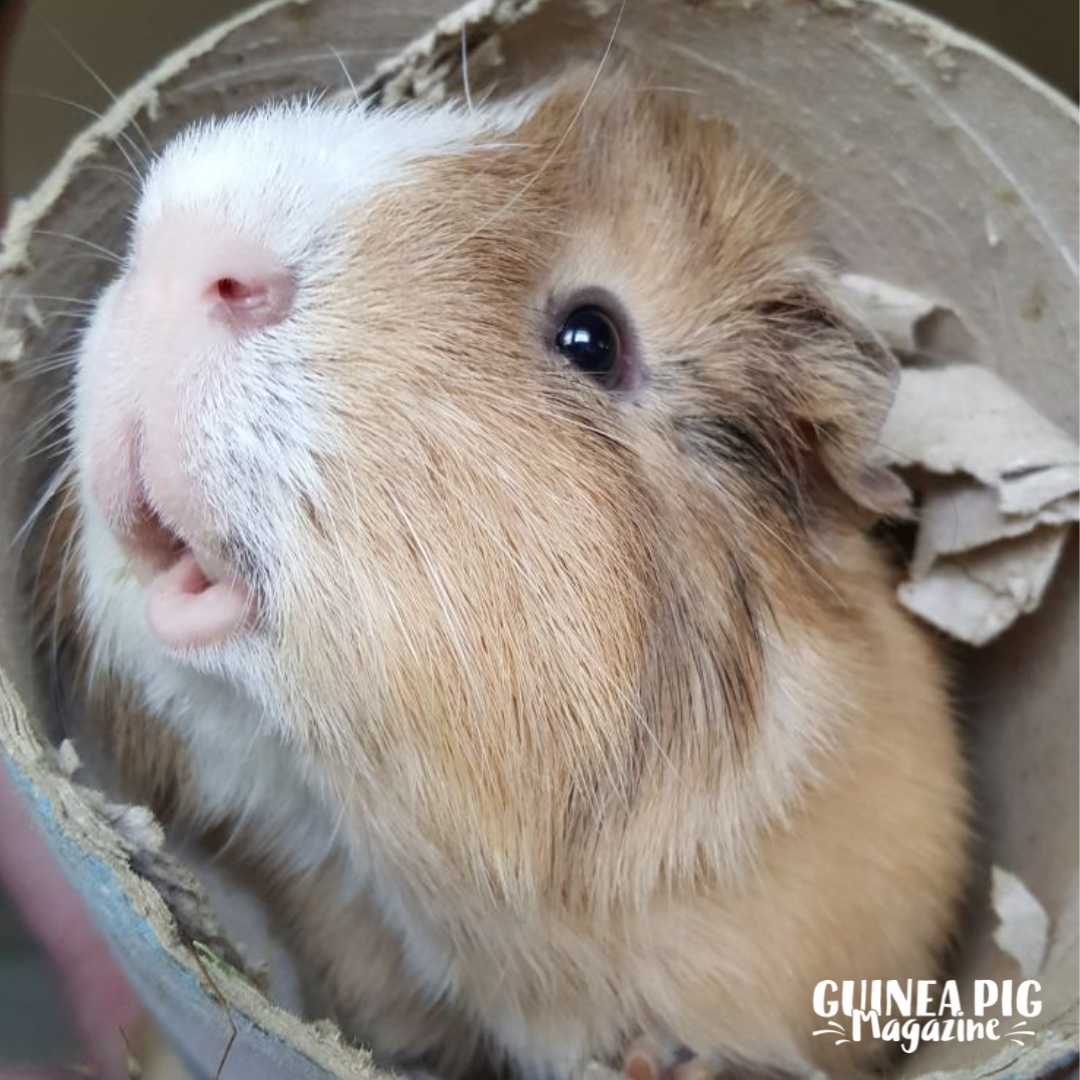
Article by Abigail Edis FdSc RVN CertVNES CCExotics veterinary nurse.
Veterinary medicine is moving forward all the time and I am very lucky to be working at the forefront of exotic animal medicine and seeing new and advancing techniques all the time. I hope the following pages help you understand what we as vets and nurses are doing to help our little furry friends and what I am personally trying to push forward.
Why are guinea pigs still classed as exotics?
This question gets asked a lot so I thought I Would get this answered. In veterinary med-icine we have four main groups of animals when vets are taught in school – farm (or large animal), equine, small animal (your reg-ular cats and dogs) and exotics (everything that is not a cat and dog).The reason that guinea pigs fall under this category of care is that they require very different medical approach to your normal cats and dogs. Not only are appropriate drugs and dosages vastly different, they also don’t have the same sorts of conditions and symptoms as cats and dogs do, making their care a bit more tricky. Vet schools do teach medicine for small furries (rabbits, guineapigs, hamsters etc). However in some placesteaching can be limited due to all the other biology and disease teaching that must be done, even though it’s 5 years it’s still not enough sometimes. Exotic medicine is a mas-sive topic in itself, this is why vets specialise in this area.Thankfully where I work I am constantly with vet students. I am continually cramming their heads with lots of basics on small furries and their care. We are increasing the amount weteach in the vet schools and bringing in more guinea pig medicine into the curriculum,which can only be a good thing.
Why use an exotics vet or piggy savvy vet?
As already mentioned guinea pigs do require a different approach to treating them as opposed to our common cats and dogs. As a quick comparison if an animal broke a leg often you would find a dog would whimper in pain and make it known to their own-ers that their leg hurts. A guinea pig on the other hand would hide its pain well, and would do everything to pretend to be walkingokay on all legs, and surprisingly they would probably continue to try and eat to look like they are perfectly fine. This is the nature of prey animals and they require vigilant owners to look after them.They also require experienced vets too.
Your vet does not need to be a specialist but does need to be aware of the nature of guinea pigs illness and also be up to date with their care, appropriate drugs and new advances and see them regularly. An exotic specialist vet is more advanced in background knowledge and has completed an extra certification in exotic spe-cies. The most common letters behind a vets name to show this is CertAVP (ZooMed. This is a certificate in advanced veterinary practice in zoological medicine, and does involve learning muchmore about guinea pigs despite being called zoological medicine.More advanced vets still will have a diploma in zoological medicine(DZooMed) and a few may be members of the European college of zoological medicine (DipECZM), these require years of learning about different species and grueling examinations as well as con-tinued teaching, lectures and examinations to remain a diplomat. Many people also think exotic vets are only interested in reptiles or birds but I can confirm this is not the case.
They have advanced knowledge in all areas of exotic medicine and attend conferences all over the world to keep up to date with the medicine in all exoticspecies.Many will of course have preferred species, but all vets and nurses naturally, but this does not mean they are not highly qualified and experienced to treat your piggies.
What is evidence based medicine?
Evidence based medicine is what we strive to work towards in all human and veterinary medicine and this involves using evidence we have to treat patients, as well as taking into account the vet/doctors expertise and the patient/owners expectations and finances. To give you a simple example going back to the broken leg example, when we see a certain type of bone fracture (there are many different types) then there may be evidence to show us the best way to fix this break, evidence may show that using a certain technique has the best possible outcome.
This can be more tricky in exotic medicine sometimes we have to extrapolate evidence and research in species closely related to guinea pigs such as rabbits or rats and use this in combi-nation with the vets experience and knowledge, this is where your specialists come into their own as they have a lot of up to date knowledge and information at their fingertips.
What has gotten better for piggies in the last 10 years?
In the last 10 years I think a few things have changed in guinea pig medicine. We are certainly seeing a far higher level of care than that we used to, we are recognizing that piggies need a higher level of support than that of many cat/ dog patients too.
Guinea pigs are thankfully starting to shake the ‘disposable pet’ label that would often mean historically owners and/or vets are not offer – ing or willing to do more advanced care. These days, rightly so, all species are being treated as equals and are more commonly being offered as much care as possible.
Of course, sometimes we are limited with finances, vet experience and also the size of piggies but we are certainly giving them a lot better nursing and gen – eral vet care. In recent years nurses have also been able to pursue more advanced certificates in exotic medicine which I have completed making that behind the scenes and all important nursing care of a much higher level. There are also a couple things in the last few years which I have been involved in pushing forward at my own practice which have really made a difference to piggie care, these are. Intravenous catheter placement – this involves placing a small cannula into the vein to administer drugs and fluids.
This is the best way to administer fluids and some drugs and really does up the game when it comes to guinea pigs care. They can be tricky to place and occasionally we may not be able to get one in but I can certainly testify it has saved several piggies lives and sped up recovery, some of those piggies include my own Advanced imaging (CT scanning) – CT scanners are basically 3D x rays, and they show pictures of the body in small slices so we can look at something in much more detail.
CT scans are especially amazing for imaging the skull and teeth as they show much more than a simple x-ray does. They are not the cheapest but they certainly are amazing pieces of equipment to use and really give us so much more information to work with as vets/nurses
My interests and specialisms – sharing the knowledge
For people who know me or chat to me they know I can be pretty busy. As well as holding down a full time job looking after sick piggies and other exotics (and looking after a herd of pigs of my own) I do a lot of things in my own time to help educate oth-ers and push guinea pig medicine forward. So here’s a little rundown of just some of the things I am doing.
Lecturing: When time allows I am often off at many national veterinary con-ferences across the country talking about piggies and other exot-ics. I tend to lecture most years and the conferences will be filled with general practice vets and nurses coming to listen about advancing the care of exotics. I also regularly give online lectures and courses and am involved in some student lecturing at the vet school. I even got to lecture at an international confer-ence this last year in London Excel, which was quite exciting.
Journal articles: There are many veterinary journals out there and I have written in a few of them in recent years. These articles have to be peer reviewed by other specialists and have to have many relevant references to give evidence of what you are writing about. I have written on guinea pig anaesthesia, GDV’s (twisted stomachs) in guinea pigs and recently co-written with a specialist vet a three part article on the veterinary care of guinea pigs to name a few.These articles help educate vets and nurse on guinea pig care and common conditions.
Student teaching: I am involved daily in the teaching and tutoring of upcoming vet students who rotate around our teaching hospital and exotics department. I also lend my own piggies out for practical teaching every year. I will take a class of students and teach them how to do a full physical examination on the piggies, talk through basics of diet, husbandry and care and what common diseases and conditions we are seeing. The herd do not mind and tend to take it all in their stride, some even seem to enjoy it.
Research and studies: I am very interested in several areas of guinea pig medicine, and when my finances stretch I will of-ten try to push forward medicine when it is right to do so with my own piggies. In recent years I Have had one of them have radioactive iodine treatment for an overactive thyroid, saved one with a twisted stomach, given acupuncture for arthritic old piggies, CT scanned where possible/appropriate and when I can taken a little extra blood for samples for further information.
One Thing I am very interested in is kidney disease in guinea pigs. I am intrigued because piggies don’t tend to show the same signs and symptoms as our usual cats and dogs do, for example the kidney values in their blood samples almost always come back as normal. I have had many of my own guinea pigs go into kidney failure where we have been unable to diagnose this in life and have discovered post mortem that their kidneys have failed. I find this very fascinating so I am hoping that in the next few years I will start putting together some of my data to come out with some useful information to vets about to diagnose the condition. The main thing holding me back is finances and time as it costs a lot of money to send off kidneys to the laboratory for analy – sis, but certainly watch this space.
Other things I am interested in and looking into are – hyperthyroidism (over active thyroid), twisted stomachs and bloating and bladder or kidney stones. Quite recently I have set up an online platform to help give owners (and veterinary professionals) more information on the basics of guinea pigs care, behaviour, medicine and general husbandry. I post regularly on a variety of topics which hope – fully helps owners and vets/vet nurses give better husbandry and veterinary care of these animals. However, no one needs excuses to post cute photos and videos online, so there are plenty of those too. I do frequent The Guinea Pig Forum too to help give advice when my time allows, my pen name is abi_nurse should you be a regular.
Why can’t vets always give an answer?
One thing I wanted to touch on in the article is why we sometimes do not get an answer when treating and diagnos – ing guinea pigs. This can be (as both an owner and as a vet/ nurse) one of the most frustrating things to have. Guinea pigs are absolutely one of the worst species at getting a diagnosis as mentioned above, things like their blood values may not change or they will show no symptoms (or very vague ones) to their owners making it often harder to find a suggested diagnosis.
As part of this issue I have done post mortems on the major – ity of my own guinea pigs after they have died or sadly been put to sleep. Because of this I have been very much enlight – ened on what they can truly put up with on the inside and not show any signs of a particular illness on the outside, and this has sparked my interest even more. I find doing a post mortem often one of the most useful things I can do on these animals, despite not being the most pleasant, it can give us so much more information we did not know. These species seem to be absolute masters of disguise, making them one of the most frustrating and the most intriguing species to work with and understand.
-
 Issue 53 – DIGITAL ONLY£4.49
Issue 53 – DIGITAL ONLY£4.49 -
 Issue 53 – PRINT ONLY£4.99
Issue 53 – PRINT ONLY£4.99

I want to study to become a guinea pig specialist so i can recogniz ena d treat my own guinea pig at our rescue